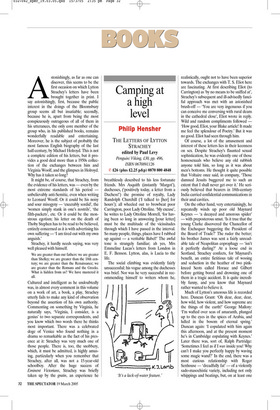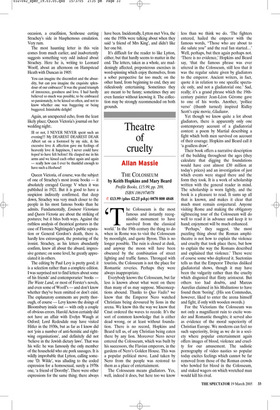Camping at a high level
Philip Hensher
THE LETTERS OF LYTTON STRACHEY edited by Paul Levy Penguin/ Viking, £30, pp. 496, ISBN 0670891126 ✆ £26 (plus £2.25 p&p) 0870 800 4848 Astonishingly, as far as one can discover, this seems to be the first occasion on which Lytton Strachey’s letters have been brought together in print. I say astonishingly, first, because the public interest in the doings of the Bloomsbury group seems all but insatiable; secondly, because he is, apart from being the most conspicuously outrageous of all of them in his utterances, the only core member of the group who, in his published books, remains wonderfully readable and entertaining. Moreover, he is the subject of probably the most famous English biography of the last half-century, by Michael Holroyd. This is not a complete edition of his letters, but it provides a good deal more than a 1950s collection of the exchanges between him and Virginia Woolf, and the glimpses in Holroyd. Why has it taken so long?
It might be, of course, that Strachey, from the evidence of his letters, was — even by the most extreme standards of his period unbelievably anti-Semitic, even when writing to Leonard Woolf. Or it could be his noisy and sour misogyny — ‘execrably sordid’, the ‘women simply stank in one’s nostrils’, ‘the filth-packets’, etc. Or it could be the monstrous egotism; his letter on the death of Thoby Stephen has to be read to be believed, entirely concerned as it is with advertising his own suffering — ‘I am tired out with my own anguish.’ Strachey, it hardly needs saying, was very well pleased with himself.
We are greater than our fathers: we are greater than Shelley; we are greater than the 18th century; we are greater than the Renaissance; we are greater than the Romans and the Greeks. What is hidden from us? We have mastered it all.
Cultured and intelligent as he undoubtedly was, in almost every comment in this volume on a work of art, a book, a play, Strachey utterly fails to make any kind of observation beyond the assertion of his own authority. Commenting on something by Virginia, he naturally says, ‘Virginia, I consider, is a genius’ to two separate correspondents, and you know which two words there he thinks most important. There was a celebrated doge of Venice who found nothing in a drama so remarkable as the fact of his presence at it: Strachey was very much one of those people. There is, too, the snobbery, which, it must be admitted, is highly amusing, particularly when you remember that Strachey, after all, was not a 15-year-old schoolboy. After the huge success of Eminent Victorians, Strachey was briefly taken up by the gratin, an experience he breathlessly described to his less fortunate friends. Mrs Asquith (instantly ‘Margot’), duchesses, (‘positively today, a letter from a Duchess!’) the promise of royalty, Lady Randolph Churchill (‘I talked to [her] for hours’); all wheeled out to browbeat poor Carrington, poor Lady Ottoline. ‘My excuse’, he writes to Lady Ottoline Morrell, ‘for having been so long in answering [your letter] must be the multitude of the vicissitudes through which I have passed in the interval. So many people, things, places have I rubbed up against — a veritable Babel!’ The awful tone is strangely familiar; ah yes, Mrs Emmeline Lucas’s letters from London in E. F. Benson. Lytton, alas, is Lucia to the life.
The social climbing was evidently fairly unsuccessful; his vogue among the duchesses was brief. Nor was he very successful in recommending himself to writers whom he, realistically, ought not to have been superior towards. The exchanges with T. S. Eliot here are fascinating. At first describing Eliot (to Carrington) as ‘by no means to be sniffed at’, Strachey’s subsequent and ill-advisedly fanciful approach was met with an astonished brush-off — ‘You are very ingenuous if you can conceive me conversing with rural deans in the cathedral close’, Eliot wrote in reply. Wild and random compliments followed — ‘How good, Eliot, your Blake article! It made me feel the splendour of Poetry.’ But it was no good. Eliot had seen through him.
Of course, a lot of the amusement and interest of these letters lies in their keenness on sex. Despite Strachey’s flaunted sexual sophistication, he was evidently one of those homosexuals who believe any old rubbish anyone told him, so long as it was about men’s bottoms. He thought it quite possible that Voltaire once said, in company, ‘Those damned Jesuits buggered me to such an extent that I shall never get over it.’ He seriously believed that bearers in 18th-century India carried confidential communications in their anal cavities.
On the other hand, very entertainingly, he repeatedly winds up poor old Maynard Keynes — ‘a decayed and amorous spider’ — with preposterous smut. ‘Is it true that the young Clarke discovered the Chancellor of the Exchequer buggering the President of the Board of Trade?’ The ruder the better; his brother James was sent a fairly unreadable tale of Neapolitan coprophagy — ‘isn’t it perfectly darling?’ At a loose end in Scotland, Strachey confects, for Maynard’s benefit, an entire fictitious tale of wooing and seduction in the heather of two pinkkneed Scots called Horace and Gilbert before getting bored and drowning one of them in a tragic accident. It is quite incredibly funny, and you know that Maynard rather wanted to believe it.
Much of Lytton’s amorous life is recorded here. Duncan Grant: ‘Oh dear, dear, dear, how wild, how violent, and how supreme are the things of the earth!’ George Mallory: ‘I’m wafted over seas of amaranth, plunged up to the eyes in the spices of Arabia, and lulled in the bosom of eternal spring.’ Duncan again: ‘I copulated with him again this afternoon, and at the present moment he’s in Cambridge copulating with Keynes.’ Later there was, sort of, Ralph Partridge: ‘Sometimes I feel as if I was inside you! Why can’t I make you perfectly happy by waving some magic wand?’ In the end, there was a most curious relationship with Roger Senhouse — ‘dreadfully fat’ — of a violently sado-masochistic variety, including not only whippings and beatings, but, on at least one occasion, a crucifixion, Senhouse cutting Strachey’s side in blasphemous emulation. Very rum.
The most haunting letter in this vein comes from much earlier, and inadvertently suggests something very odd indeed about Strachey. Here he is, writing to Leonard Woolf, about an afternoon on Hampstead Heath with Duncan in 1905:
You can imagine the discomfort and the absurdity, but can you imagine the exquisite splendour of our embraces? It was the grand triumph of innocence, goodness and love. I had hardly believed so much was possible; to be embraced so passionately, to be kissed so often, and not to know whether one was buggering or being buggered. Inimitable delight!
Again, an unexpected echo, from the least likely place; Queen Victoria’s journal on her wedding night:.
Ill or not, I NEVER NEVER spent such an evening!!! My DEAREST DEAREST DEAR Albert sat on a footstool by my side, & his excessive love & affection gave me feelings of heavenly love & happiness, I never could have hoped to have felt before! He clasped me in his arms and we kissed each other again and again — really how can I ever be thankful enough to have such a Husband!
Queen Victoria, of course, was the subject of one of Strachey’s most ironic books — it absolutely enraged George V when it was published in 1921. But it is good to have a suspicion indirectly confirmed, that deep down, Strachey was very much closer to the people in his most famous books than he admits. Fundamentally, Eminent Victorians and Queen Victoria are about the striking of postures; but it bites both ways. Against the ruthless analysis of theatrical gestures in the case of Florence Nightingale’s public reputation or General Gordon’s death, there is, hardly less extravagant, the posturing of the ironist. Strachey, as his letters abundantly confirm, knew all about the absurd, impressive gesture; on some level, he greatly appreciated it in others.
The editing by Paul Levy is pretty good; it is a selection rather than a complete edition. I was surprised not to find letters about some of his friends’ and contemporaries’ books The Waste Land, or most of Forster’s novels, and even some of Woolf’s — and don’t know whether they’ve been omitted or don’t exist. The explanatory comments are pretty thorough, of course — Levy knows the doings of Bloomsbury inside out — with only a couple of obvious errors. Harold Acton certainly did not have an affair with Evelyn Waugh at Oxford; Lord Redesdale may have visited Hitler in the 1930s, but as far as I know did not ‘join a number of anti-Semitic and rightwing organisations’, and definitely did not ‘believe in the Jewish dietary laws’. That was his wife: he was famously the only member of the household who ate pork sausages. It is wildly improbable that Lytton, calling someone ‘D. Wilde’, was alluding to the coded expression for a homosexual, surely a 1970s one, ‘a friend of Dorothy’. There were other expressions for the same thing; there always have been. Incidentally, Lytton met Viva, the one the 1950s were talking about when they said ‘a friend of Mrs King’, and didn’t like her one bit.
It’s difficult for the reader to like Lytton, either, but that hardly seems to matter in the end. The letters, taken as a whole, are maddeningly affected, preposterous exercises in word-spinning which enjoy themselves, from a sober perspective far too much; on the other hand, from beginning to end, they are ridiculously entertaining. Sometimes they are meant to be funny; sometimes they are even funnier without knowing it. The collection may be strongly recommended on both grounds.

















































 Previous page
Previous page